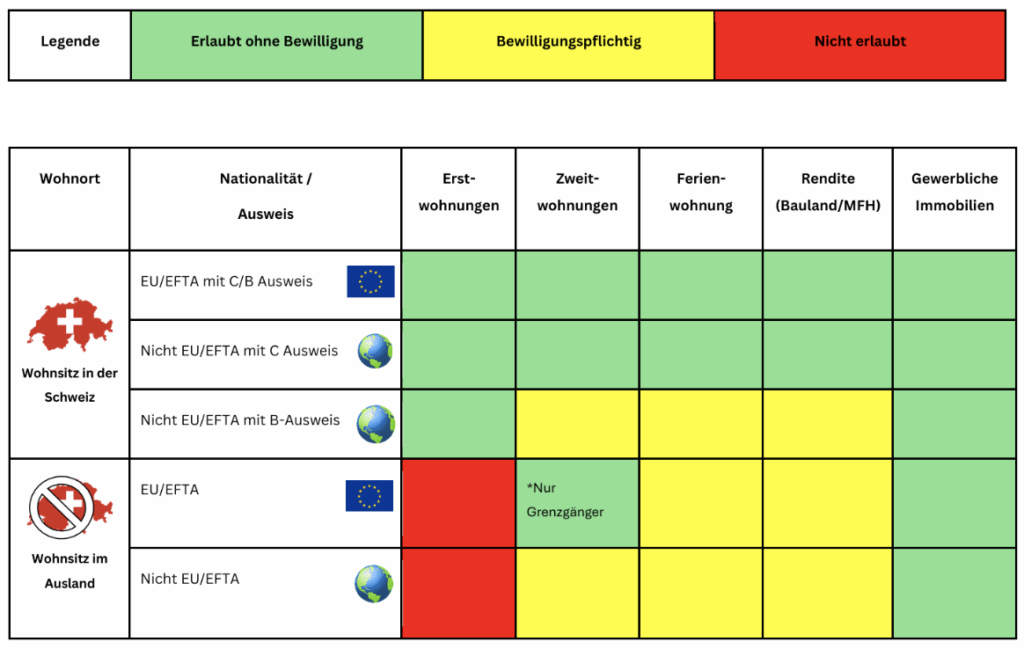What is often forgotten: Many real estate purchases made by ‘persons from abroad’ are not subject to the Lex Koller. This is because not only nationality is decisive, but also residency status. In practice, someone who has a residence permit is often not considered a ‘person abroad’ within the meaning of the Lex Koller – and therefore does not need permission
.
What does the Lex Koller regulate and to whom does it actually apply?
In principle, the Lex Koller requires foreign nationals to apply for a permit before acquiring land or property in Switzerland. At first sight, this seems restrictive, but in reality the law only applies to a small proportion of cases. The reason is that many buyers are not considered foreign citizens under the law.
They are not considered foreign nationals within the meaning of the Lex Koller
- all persons in possession of a residence permit C and domiciled in Switzerland
- nationals of EU/EFTA countries who reside in Switzerland and hold at least a B residence permit
In practice, this means that, for example, German nationals with a B permit or US citizens with a C permit living in Switzerland can buy a house without any problems – and without having to obtain a permit. This puts them on an equal footing with Swiss citizens as far as real estate transactions are concerned.
The following diagram shows the scope of application of the Lex Koller according to use and type of property:

Exceptions to the authorisation requirement – clearly regulated
If it is indeed persons from abroad within the meaning of the Lex Koller, the law nevertheless provides for several exceptions for which no authorisation is required. The main exceptions are as follows:
- Third-country national s holding a B residence permit and domiciled in Switzerland may purchase a property as their main residence.
- Cross-border commuters may purchase a second home in the border area of their place of work .
- Permanent establishments: commercial properties used for operational purposes can be purchased regardless of the residence status or origin of the owners.
- Holiday flats: in recognised tourist regions, up to 1,500 units may be sold to foreign residents each year throughout Switzerland. Quotas are allocated by the cantons and municipalities may also set their own restrictions or refusals.
Restrictions on exceptions
Anyone requesting an exception is subject to specific restrictions on the use and nature of the property.
Surface :
- main residence (third-country nationals): max. 3,000 m².
- holiday accommodation: max. 2,000 m².
- Cross-border commuters: max .1,000 m².
Living space :
- Holiday flats: max . 200 m².
- For the other categories, there is no legal limit on living space.
Other features:
- Renting is not permitted in all exceptional cases.
- For building land: constructionmust begin within one year.
Principle: if a permit is needed, it is usually a problem.
If permission is nevertheless required as part of a transaction, special care must be taken. In advisory practice, the principle is that an acquisition subject to authorisation is a special case and should always be examined with a critical eye. In such cases, it is advisable to involve the competent cantonal authorities at an early stage and, if necessary, to ask for prior clarification (request for a statement of facts)
.
Procedure and powers
The cantonal authorities are responsible for verifying the need for an authorisation and for granting it . In case of uncertainty , a request for a ruling can be submitted to obtain clarification on the applicability of the Lex Koller
.
Conclusion – Understanding and applying the Lex Koller
At first sight, the Lex Koller appears to be a comprehensive and restrictive law. In practice ,however, itisnot appliedin many cases, as a large percentage of buyers are not considered foreigners within the meaning of the law. The decisivefactoris notnationality, but residency status.
Only when a permit is required does more care need to be taken. In these cases, a thorough examination should be carried out, possibly with the participation of the cantonal authorities.
The rule for real estate professionals is therefore: do not be discouraged – provide differentiated and legally secure advice.


